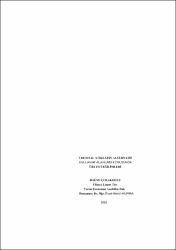| dc.contributor.author | Çolakoğlu, Bağnu | |
| dc.contributor.author | Çolakoğlu, Bağnu | |
| dc.date.accessioned | 2018-06-12T12:13:17Z | |
| dc.date.available | 2018-06-12T12:13:17Z | |
| dc.date.issued | 2018 | |
| dc.identifier.uri | https://hdl.handle.net/20.500.11776/2656 | |
| dc.description.abstract | Tarımsal atık, her türlü bitkisel ve hayvansal ürün elde edilirken, ürünün işlenmesi sırasında veya sonrasında ortaya çıkan atıklardır. Tarımsal atıkların ortaya çıkışında ve miktarında, üretilen ürün miktarının yanı sıra üretimin gerçekleştiği toplumun sosyoekonomik özellikleri, beslenme alışkanlıkları, gelenekler, coğrafi koşullar, iklim, sanayi tesisine olan uzaklık, eğitim gibi birçok etken mevcuttur. Nüfus artışı ile tarımsal üretim ve tarımsal atık miktarı da artmıştır. Tarımsal üretim alanlarının aynı olması fakat ihtiyacın sürekli artması nedeniyle kırsal alandan kentlere göç, işsizlik, eğitim, sağlık, çarpık kentleşme gibi birçok sorun ile beraber çevre sorunlarının da hızlı artışını beraberinde getirmiştir. Bu sorunların çözülebilmesi için birinci ve en önemli koşul; kırsal alanda yaşayan ve geçimini tarımsal üretim ile sağlayan üreticilerin gelirlerinin artışı ve yaşam koşullarının iyileştirilmesidir. Yenilenebilir enerji kaynaklarına olan ihtiyacın artması, çevre sorunlarının çözümü, tarımsal üretimde istihdamın artması gibi birçok etken tarımsal atıkların değerlendirilmesini gerekli kılmaktadır. Tarımsal atıkların oluşumunda, değerlendirilmesinde, bertaraf edilmesinde ilk ve en önemli basamağı tarım üreticileri oluşturmaktadır. Oluşan atıkların cinsi, ne zaman ve ne sıklıkla oluştuğu, miktarı, nerede saklandığı ya da değerlendirildiği gibi birçok öncelikli konuyu üretici bilmektedir. Bu nedenle tarımsal atıkların değerlendirilmesine ilişkin çiftçilerin görüşleri son derece önemlidir. Yapılan bu çalışmada üreticiler ile yüzyüze görüşme sağlanmış ve tarımsal atıkların farklı şekillerde değerlendirilmesine ilişkin eğilimleri irdelenmiştir. Çalışmada üreticilerin tarımsal atıkların alternatif kullanım alanlarına ilişkin görüşlerinin pozitif yönde olduğu belirlenmiştir. Oluşturulacak değerlendirme tesislerine kendi bütçelerini sarsmayacak ölçüde maddi destek verme konusunda da isteklidirler. | en_US |
| dc.description.abstract | Agricultural residue is residues generated during or after the processing of the product, when all kinds of plant and animal products are obtained. In the emergence and amount of agricultural residues, there are many factors such as the socioeconomic characteristics of the production, the dietary habits, traditions, geographical conditions, climate, distance to the industrial plant, education as well as the amount of product produced. Population growth has also increased agricultural production and agricultural residue. The agricultural production areas are the same but due to the continuous increase in the need, migration of rural areas to urban areas has accompanied many problems such as unemployment, education, health, uneven urbanization, and the rapid increase of environmental problems. The first and most important condition for solving these problems is; the increase in the incomes of the farmers living in rural areas and their livelihood through agricultural production, and the improvement of living conditions. Many factors such as increasing need for renewable energy resources, solving of environmental problems, increasing employment in agricultural production require the evaluation of agricultural residues. Agricultural producers constitute the first and most important step in the formation, evaluation and disporal of agricultural residues. Producers know that priority issues which like the type of residue they produce, when and how often they occur, quantity, where it is stored or evaluated. For this reason, farmers' views on the assessment of agricultural residue are extremely important. In this study, a face-to-face interview was conducted with producers and the tendency of evaluating agricultural residues in different forms was examined. In the study, it was determined that producers' opinions on alternative uses of agricultural residues were positive. They are also eager to provide financial support to the evaluation facilities to be formed in such a way as not to shake their budgets. | en_US |
| dc.language.iso | tur | en_US |
| dc.publisher | Namık Kemal Üniversitesi | en_US |
| dc.rights | info:eu-repo/semantics/openAccess | en_US |
| dc.subject | Atık | en_US |
| dc.subject | Tarımsal atık | en_US |
| dc.subject | Yenilenebilir enerji | en_US |
| dc.subject | Çiftçi yaklaşımları | en_US |
| dc.subject | Residue | en_US |
| dc.subject | Agricultural Residue | en_US |
| dc.subject | Renewable Energy | en_US |
| dc.subject | Farmers’Apporoaches | en_US |
| dc.title | Tarımsal atıkların alternatif kullanım alanları konusunda üretici eğilimleri | en_US |
| dc.title.alternative | FARMERS’ APPOROACHES ON ALTERNATIVE USES OF AGRICULTURAL RESIDUES | en_US |
| dc.type | masterThesis | en_US |
| dc.department | Enstitüler, Fen Bilimleri Enstitüsü, Tarım Ekonomisi Ana Bilim Dalı | en_US |
| dc.relation.publicationcategory | Tez | en_US |



















